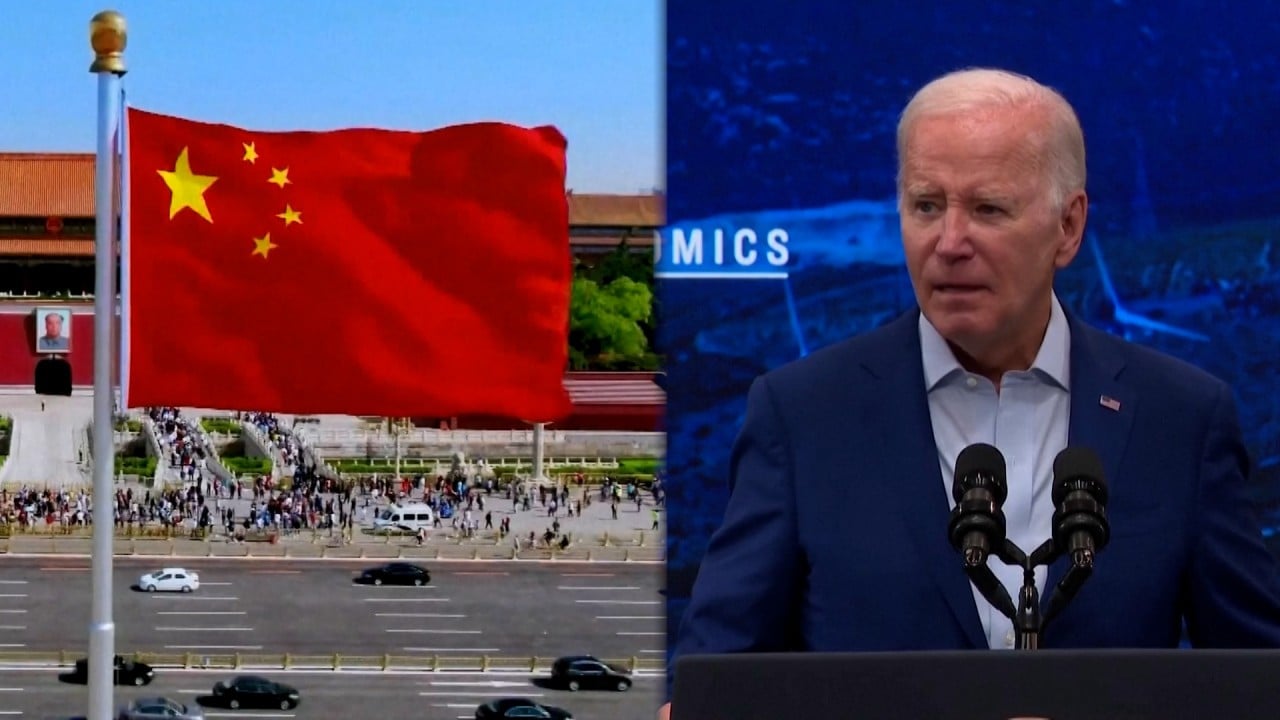US curbs target Chinese companies, but bilateral ties could be biggest casualty as tech war ramps up
Washington’s technology investment curbs add new uncertainties to its fraught relationship with Beijing, with the new weapon in its tech control arsenal raising concerns that US allies could take similar action.
US President Joe Biden revealed a long-anticipated executive order on Wednesday restricting US venture capital and private equity investments in Chinese companies in three areas.
The order affects semiconductors and microelectronics, quantum information technologies and certain artificial intelligence systems – technologies Washington regards as critical for its national security and Beijing deems crucial for its development.
Beijing “strongly deplores and firmly opposes” the roll-out of restrictions on investments in China, the Chinese foreign ministry said on Thursday, calling it “economic coercion and tech bullying”.

01:56
Biden to introduce new restrictions on US investments in China, declares tech ‘emergency’
Biden to introduce new restrictions on US investments in China, declares tech ‘emergency’
“Restricting US companies’ investments in China with national security as a front is a clear act of overstretching the concept of security and politicising business engagement,” the ministry said in a statement on its website.
“The move’s real aim is to deprive China of its right to develop, and selfishly pursue US supremacy at the expense of others,” it said. “This is deglobalisation and a move to phase China out.”
The order bans private equity, venture capital, joint ventures and greenfield investments by US entities in China in advanced semiconductor and AI technologies and some quantum computing systems.
It is aimed at preventing American capital and expertise from benefiting China’s military modernisation and undermining US national security.
For investments in less-advanced semiconductors, investors will have to notify the US government under the new rules, with details to be drafted by the Treasury Department after taking comments from stakeholders and the public.
US chip industry urges clear access to China market after Biden’s tech order
US chip industry urges clear access to China market after Biden’s tech order
The rules govern US investments in China, including its special administrative regions of Hong Kong and Macau, as Washington aims to fill the loophole of capital seeking to circumvent the restrictions.
These curbs, which will be put in place next year, will apply mainly to “active” investments, such as equity investments through mergers and acquisitions that confer cash or “intangible benefits” including management help and acquisition of talent, customers or suppliers, according to the Treasury.
“Passive investments” such as holdings in publicly traded Chinese companies are not targeted by the rules.
According to the Treasury, it adopts a “small yard, high fence” approach – that is, a narrow focus on a small number of critical technologies – to limit disruptions to ordinary capital flows between the two countries.
Chinese tech stocks, from semiconductor makers to artificial intelligence developers, closed lower on Thursday, but most of them declined only slightly as the executive order has been long in the making and details are yet to be worked out.
China’s biggest chip maker Semiconductor Manufacturing International Corp lost 0.5 per cent. Hua Hong Semiconductor, the second largest, slipped 0.7 per cent.
Baidu, whose ChatGPT-like chat robot Ernie Bot is undergoing internal testing, slipped 0.3 per cent. SenseTime Group, which unveiled its AI model SenseNova in April, fell 2.4 per cent.
The long-run impact on bilateral relations and investment could be greater, however, as the financial curbs would be the second shoe to drop following existing US export controls, ramping up a tech war and geopolitical rivalry between Beijing and Washington, according to analysts.
New US investment curbs to have limited impact on China’s targeted tech sectors
New US investment curbs to have limited impact on China’s targeted tech sectors
Li Wei, director of the Centre for American Studies at Renmin University in Beijing, said it was a “significant move” for the US to introduce the financial tool in the tech war with China.
“Previously, the US contained China by restricting tech exports. Now it aims to restrain the financing activities of Chinese hi-tech companies by issuing the executive order,” Li said.
“It would probably hit the targeted Chinese companies hard by cutting their financial lifelines and hampering their technological upgrading.
“To make things worse, its allies like Japan and the UK may follow suit.”

08:54
Is China’s technology falling behind in the race for its own ChatGPT?
Is China’s technology falling behind in the race for its own ChatGPT?
Yanmei Xie and Arthur Kroeber, analysts with consultancy Gavekal Dragonomics, said they expected Washington’s priority to be lobbying its allies to set up matching systems.
“The European Commission already plans to propose a European Union screening system this year as part of its broad strategy to de-risk from China. G7 leaders jointly endorsed the principle of outbound investment screening following a summit in May,” they wrote in a research note on Thursday.
“Regardless how these efforts go, the direction of travel is clear: Western countries are moving towards discouraging investments that fuel China’s technological advance.”
They expect China’s initial response to the investment curbs would most likely be muted, as US officials, led by Treasury Secretary Janet Yellen, have made the case in Beijing that the restrictions are narrowly focused on national security and do not threaten China’s overall development.
“But China may eventually experiment with its own export controls, targeting inputs such as minerals critical for technology production,” they wrote.
“A warning shot was the imposition of licensing requirements on exports of gallium and germanium, two minerals commonly used in semiconductors.”
Pang Zhongying, a professor of international affairs at Sichuan University, said the curbs would make the outlook for China-US relations grimmer, after there were signs of a thaw following recent visits by several US officials.
The Biden administration has sought to calm relations with China by sending Secretary of State Antony Blinken, Treasury Secretary Yellen and other top officials to talk to Chinese counterparts. Gina Raimondo, the US commerce secretary, is also expected to visit in the coming weeks.

03:36
China restricts critical metal exports following Western semiconductor curbs in latest trade war
China restricts critical metal exports following Western semiconductor curbs in latest trade war
Pang said the executive order “raises the question of whether the communications were effective. It doesn’t bode well for bilateral ties”.
“The introduction of investment restrictions may be a negotiation tactic, like the trade curbs imposed by the Trump administration. However, once installed, they are hard to remove,” he said.
Sung Wen-ti, a political scientist at Australian National University, noted that the order was issued just before Raimondo’s trip to China for more trade talks, drawing a line in the sand about what is up for negotiation.
Sung said the US had signalled “time and again” that its interest in rapprochement with China did not entail self-censorship or softening on other critical areas such as security and technology.
He said the move served to show US allies “which way the wind is blowing”.
“US allies will likely follow suit but their pace will be uneven, given the nature of their uneven sense of urgency and stake in the economic and technological relationship with China.”
The introduction of investment restrictions may be a negotiation tactic
An executive with a Chinese technology company said funding would not be a major problem for his company or many of his peers as they relied heavily on state funds and domestic fundraising in recent years amid growing tensions with the West.
“The biggest impact would be on communication with the West,” the executive said, speaking on condition of anonymity.
“Scientific research and technology innovation need an open world. The curbs would hamper the flow of sharing knowledge and information, discourage industry exchanges and eventually hurt the interests of both Chinese and American companies.”
US investments into China have already plunged in anticipation of the measure. According to the Rhodium Group, the value of US foreign direct investment in China was US$8 billion last year – the lowest since 2005.
The value of US venture capital investments in China was US$1 billion last year, compared to a high of US$19 billion in 2018, according to the think tank.
Additional reporting by Hayley Wong, Shidong Zhang and Dannie Peng


